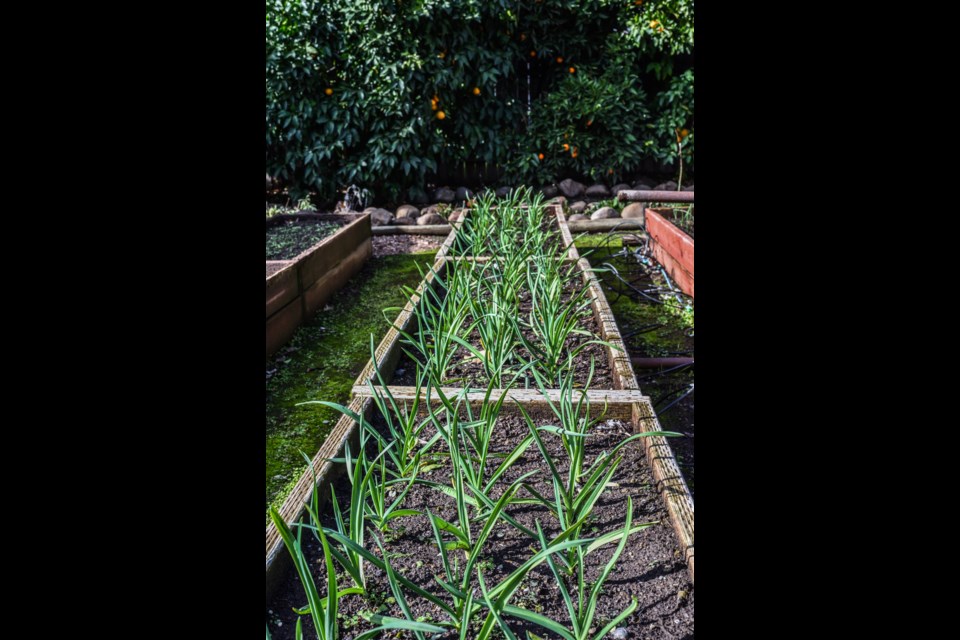Novice and seasoned gardeners in the qathet region are taking a much needed breather from the busyness of spring and summer planting, harvesting and weed pulling.
Powell River Garden Club president Lesley Moseley is enjoying the messiness that comes with fall/winter gardening, and the time needed to think about next year's planting.
“I like the slowdown of weeds; I really enjoy that,” said Moseley. “I love this time of year, the mess that comes with fall, and the leaves all over the grass. When you are gardening all summer, it gets to be a slog and it’s nice to take a breather in the fall.”
Moseley said many folks have the urge to tidy up their yard, but the best thing to do, she said, is to leave things as they are.
“Leave the plants in the soil,” said Mosley. “Some want to clean and tidy so everything looks nice but the best thing to do is leave everything, because a lot of critters like to live under the leaves and dying material.”
Moseley said this is a great time of year to plant garlic and any flower bulbs for the spring, such as tulips or crocuses.
“Lift dahlia roots out of the ground to dry them out and store them in peat moss,” said Moseley. “They don’t mind the cold but don't like being wet, so store them in a shed or somewhere dry.”
Bulbs, garlic, nitrogen
Moseley said not to stress about when to get the flower bulbs or garlic in the ground; sometimes she plants things in January and February.
“Doesn’t really matter when you plant it, and you can late in the season, but the idea is to get them in the ground in the winter, and they will naturally come up when the weather warms up,” she added.
Now is also an advantageous juncture to plant cover crops such as clover and broad beans, as they put nitrogen into the soil.
“This is a good time of year to get alfalfa pellets from the store and put them in the soil, which also releases nitrogen,” said Moseley.
Right now she is planning for next year and protecting her soil over the winter.
“In the fall, where you plan to grow a new vegetable or a flower garden, lay down sheets of cardboard to kill the grass and weeds; cover with layers of compost, seaweed, rotted manure and leaves,” suggested Moseley. “I put branches on it to keep things from blowing away.”
Mosley emphasized that over the winter, the cardboard breaks down and the soil is nourished, and come spring, to apply a layer of garden soil and plant seeds.
“I started a wildflower border last fall and this year I'm planting bulbs,” said Moseley. “It's an easy no-dig way to create a garden, except for digging holes for the bulbs. The idea is for protection, as it feeds earthworms and keeps the ground from getting packed down.”
Over-winter crops
Moseley describes this type of gardening as lasagna gardening. Although people do plant things over the winter for harvest, our winter climate is not the best for growing, she adds.
“Right now is not necessarily an opportune time to start planting vegetables,” said Moseley. “There are things like Swiss chard and sorrel that can be planted and harvested over winter, anything that comes from a place like Siberia should be okay. I still have carrots in the greenhouse and pull them up all winter.”
Another very west-coast gardening trick is putting seaweed on soil beds.
“Collecting seaweed that’s above the tideline is also an option,” said Moseley. “However, don't collect in December or January, when the herring are spawning.”
Seaweed is full of nutrients that most soils love and can be spread over garden beds during the winter.
Native plants
Increasingly gardeners have become interested in acquiring west-coast native plant species, as they are more in-tune with the local climate. Some gardeners like them because they are usually drought-resistant and require less water.
“This is a great time of year to plant native plants, but a few years ago it was hard to find a place that sold them,” said Moseley. “It’s not a great idea to dig them up from the woods because chances are they will die.”
Now, many plant nurseries, including one on Vancouver Island, specialize in coastal-plant species.
Moseley said when she first moved to the region she joined Powell River Garden Club. It was a great resource of information for her, specifically gardening in the qathet region, she added.
“We do tend to get more sunshine and it's drier,” said Moseley. “We are dealing with heat, drought, then deluge of rain [in summer months]. Gardening is an ongoing modification and learning process.”
Garden club a resource
According to Moseley, the club has guest speakers every month and members share gardening advice and information at meetings. They also put out a newsletter called Dear Ivy, where folks can ask questions about gardening and see answers in the monthly publication.
“The club has been a great resource to understand what is successful here and what’s not,” said Moseley.
To read or join the garden club blog, go to powellrivergardenclubblog.blogspot.ca or email
[email protected] for information about meetings.
Join the Peak’s email list for the top headlines right in your inbox Monday to Friday.




